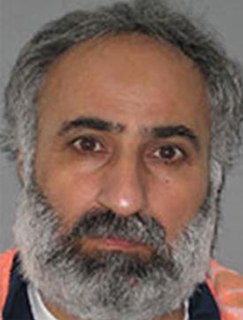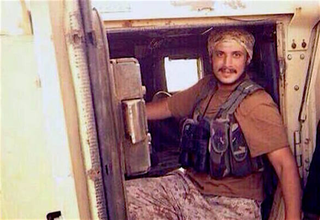
The Islamic State of Iraq and the Levant, also known as the Islamic State of Iraq and Syria, officially known as the Islamic State (IS) and also known by its Arabic acronym Daesh, is a former unrecognized proto-state that follows a Salafi jihadist doctrine. ISIL was founded in 1999 by Jordanian Salafi jihadist Abu Musab al-Zarqawi under the name Jama'at al-Tawhid wal-Jihad and gained global prominence in early 2014 when it drove Iraqi government forces out of key cities in its Western Iraq offensive, followed by its capture of Mosul and the Sinjar massacre.

Abu Bakr al-Baghdadi, born Ibrahim Awad Ibrahim Ali al-Badri al-Samarrai, was an Iraqi terrorist and the leader of the Islamic State of Iraq and the Levant (ISIL) from 2014 until his death in 2019.
The persecution of Christians by ISIL involves the systematic mass murder of Christian minorities, within its region of control in Iraq, Syria and Libya by the Islamic extremist group Islamic State of Iraq and the Levant (ISIL). Persecution of Christian minorities climaxed following its takeover of parts of Northern Iraq in June 2014.

In response to rapid territorial gains made by the Islamic State of Iraq and the Levant (ISIL) during the first half of 2014, and its universally condemned executions, reported human rights abuses and the fear of further spillovers of the Syrian Civil War, many states began to intervene against it in both the Syrian Civil War and the Iraqi Civil War. Later, there were also minor interventions by some states against ISIL-affiliated groups in Nigeria and Libya.

Abdulrahman Mustafa al-Qaduli, better known by his noms de guerre Abu Ala al-Afri and Abu Ali al-Anbari, was the governor for territories held by the Islamic State of Iraq and the Levant (ISIL) in Syria. Considered the ISIL second-in-command, he was viewed as a potential successor of ISIL leader Abu Bakr al-Baghdadi.

The military of ISIL is the fighting force of the Islamic State of Iraq and the Levant (ISIL). The total force size has been estimated from tens of thousands to over two hundred thousand. ISIL's armed forces grew quickly during its territorial expansion in 2014. The ISIL military, including groups incorporated into it in 2014, openly operates and controls territory in multiple cities in Libya and Nigeria. In October 2016, it conquered the city of Qandala in Puntland, Somalia. It conquered much of eastern Syria and western Iraq in 2014, territory it lost finally only in 2019. It also has had border clashes with and made incursions into Lebanon, Iran, and Jordan. ISIL-linked groups operate in Algeria, Pakistan, the Philippines, and in West Africa. In January 2015, ISIL was also confirmed to have a military presence in Afghanistan and in Yemen.

Adnan Latif Hamid al-Suwaydawi al-Dulaymi, also known by his noms de guerre Abu Mohannad al-Suwaydawi, Abu Abdul Salem, Haji Dawūd, and Abu Ayman al-Iraqi, was a top commander in the Islamic State of Iraq and the Levant (ISIL) and the former head of its Military Council.

In October 2014, the self-declared Islamic State of Iraq and the Levant (ISIL) took control of numerous government buildings, security vehicles and local landmarks in the Eastern Libyan coastal city of Derna. Although some media outlets reported the control as being absolute, rival groups like the al-Qaeda-affiliated Abu Salim Martyrs Brigade continued to control parts of the city. Clashes erupted between ISIL and an alliance of Islamist groups in June 2015, with ISIL retreating from Derna to outlying suburbs the following month. However, clashes continued between the Islamist alliance and the Tobruk-based government forces.

The core of the territory of the Islamic State of Iraq and the Levant was, from 2014 until 2019, in Iraq and Syria, where the proto-state controlled significant swathes of urban, rural, and desert territory. The Islamic State also controls territory in Afghanistan as well as Nigeria, possibly holds areas in Somalia, Mozambique, and the Democratic Republic of the Congo, and used to control land in Libya, the Philippines, Egypt, and Yemen. The group also has insurgent cells in India, Algeria, Iraq, Tunisia, the Caucasus, and Saudi Arabia that do not control territory. By late March 2019, ISIL territory in Syria was reduced to only the besieged 4,000 km2 (1,550 sq mi) Syrian Desert pocket. The enclave was surrounded by Syrian government forces and its allies. The Syrian military conducted combing operations and airstrikes against the pocket, but with limited success.

The Islamic State of Iraq and the Levant is a militant Islamist group active in Libya under three branches: Fezzan Province in the desert south, Cyrenaica Province in the east, and Tripolitania Province in the west. The branches were formed on 13 November 2014, following pledges of allegiance to ISIL leader Abu Bakr al-Baghdadi by militants in Libya.
Wissam Najm Abd Zayd al-Zubaydi, better known by his noms de guerre Abu Nabil al Anbari, Abul Mughirah al Qahtani or Abu Yazan al-Humairi was a commander in the Islamic State of Iraq and the Levant (ISIL) and the leader of its Libyan branch. Al-Anbari was killed by a US military airstrike on 13 November 2015.
In early 2014, the jihadist group Islamic State of Iraq and the Levant captured extensive territory in Western Iraq in the Anbar campaign, while counter-offensives against it were mounted in Syria. Raqqa in Syria became its headquarters. The Wall Street Journal estimated that eight million people lived under its control in the two countries.
This article contains a timeline of events from January 2015 to December 2015 related to the Islamic State of Iraq and the Levant (ISIL/ISIS). This article contains information about events committed by or on behalf of the Islamic State, as well as events performed by groups who oppose them.

Abu Jandal al-Kuwaiti was a leading official of the Islamic State of Iraq and the Levant, serving as important military commander, recruiter and propagandist. Known for his command capabilities and popular among his subordinates, Abu Jandal was called "The Lion" among ISIL fighters and fought in several battles in Syria and Iraq. By late 2016, Abu Jandal had become ISIL's second highest-ranking commander in Syria and led the defense of its de facto capital Raqqa against the Syrian Democratic Forces (SDF). He was killed by a US airstrike on 26 December 2016.

The 2017 Abu Kamal offensive, codenamed Operation Fajr-3, was a military offensive launched by the Syrian Arab Army and its allies against members of the Islamic State of Iraq and the Levant (ISIL) in the Deir ez-Zor Governorate. The aim of the offensive was to capture ISIL's last urban stronghold in Syria, the border town of Abu Kamal. This offensive was a part of the larger Eastern Syria campaign.
Al-Barakah is a Syrian administrative district of the Islamic State of Iraq and the Levant (ISIL), a Salafi jihadist militant group and unrecognised proto-state. Originally set up as al-Barakah Province to govern ISIL territories in al-Hasakah Governorate, the province shifted south after 2016 due to the territorial losses to the YPG/YPJ. Having been demoted from province to district in 2018, al-Barakah administered a small strip of land along the Euphrates in Deir ez-Zor Governorate until the Battle of Baghuz Fawqani.
The history of the Islamic State of Iraq and the Levant (ISIL) began with the group's foundation in 1999 by Jordanian Salafi jihadist Abu Musab al-Zarqawi under the name Jamāʻat al-Tawḥīd wa-al-Jihād. In a letter published by the US State Department in February 2004, Zarqawi wrote that jihadists should use bombings to start an open sectarian war in Iraq so that Sunnis from other countries would mobilize against the assassinations carried out by Shias, specifically the Badr Organisation, against Ba'athists and Sunnis. The Islamic State would eventually grow to control territory with a population of millions.
Abdul Nasser Qardash is an Iraqi-born militant who in 2019 was wrongly reported as the leader of the Islamic State of Iraq and the Levant (ISIL). He was also nicknamed "The Professor" and "Destroyer". Although his role within ISIL is unclear, he is reported as one of ISIL's top commanders and tipped as a potential candidate for ISIL leadership succession. However days after the death of Al-Baghdadi, ‘Abdul-Rahman Al-Mawlah known as Abu Ibrahim al-Hashimi al-Qurashi was ultimately chosen as the new declared leader of ISIS.

Abu Ibrahim al-Hashimi al-Qurashi is an Iraqi Islamist who is the second and current leader of the Islamic State of Iraq and the Levant. According to January 2020 press reports, his true identity is Amir Mohammed Abdul Rahman al-Mawli al-Salbi. His appointment by a shura council was announced by ISIL media on 31 October 2019, less than a week after the death of Abu Bakr al-Baghdadi. The U.S. Rewards for Justice Program is offering up to $10 million in exchange for information leading to al-Qurashi's apprehension.










